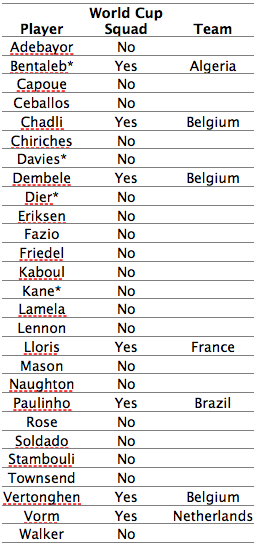A FIFA taskforce, led by Sheikh Salman bin Ebrahim Al-Khalifa, yesterday announced their recommendation that the 2022 Qatar World Cup finals should be played from November to December. This was described by Football Association chairman Greg Dyke as “the best of the bad options”.
Indeed the ramifications for the English Premier League could be huge because, as I see it, there are only really two choices. Choice A is that the August to May Premier League schedule is retained and teams simply lose players, just like they do for the Africa Cup of Nations. Choice B is that we have a winter break and so have to start the 2022/23 season earlier and finish it later. This might also have an impact on the timetable for the 2021/22 and the 2023/24 seasons.
To get a sense of the kind of disruption this might have, I thought about using the current Tottenham Hotspur squad and imagining that the last World Cup finals occurred between November and December 2014 instead of in the summer.
So let’s start with Choice A and imagine that the summer transfers still went through but the exact same World Cup squads were picked (with the same injuries keeping certain players out). The season kicks off in August 2014 and then only a few months later some of our players fly off to Qatar. My main question is how many of our first team have we got left?
This is actually a tricky question to answer as it depends on exactly how you define the first team. For the sake of this however, I defined it as the total number of squad players (named in the 25 man squad) plus the total number of U-21 players who have broken into the first team and played more than 5 games. For this I used the Premier League as a source. I then looked at how many of these were named in the World Cup 2014 squads to see what percentage would have gone and what percentage would have stayed.
The simple result is that based on all the above variables Tottenham would have only lost 26% of their first team players leaving 74% to play in club games. Table 1 shows the basic data.
This doesn’t sound that bad but I would argue it is slightly underrepresented by the fact that two of our injured players probably would have made the England squad had they been fit (Townsend and Walker). Including these two would have meant losing 33%, so a third. In addition to this the fact the we have the lowest average age of any first team in the division means that many of these young players have yet to establish themselves on the international scene. Fast forward a few years, say by using the World Cup 2018 squads, and it might be a different story with Kane, Lamela, Mason etc. all being regular internationals. Obviously this is all spurious as teams could change, domestically and nationally, and it could be a totally different story in 2022 but it gives you some idea. For those that are interested Table 2 shows the full Spurs squad breakdown. If I have the time (and patience) I’ll produce data for all Premier League teams for comparison as I would assume that the best sides would be worst affected.
Let’s move on to Choice B and consider the scenario that we are forced into a winter break. Looking at various dates and trends I have estimated that on average each Premier League season lasts for 40 weeks (including the European competition finals). Each summer break lasts for around 13 weeks before it all starts again. The last World Cup lasted 32 days from opening to closing games so if we factor in travelling time and round up it equates to needing around 40 days (or 5.7 weeks) out for the competition.
So again looking at Spurs, by the end of the current season (optimistically assuming we get to the Europa League final!) we will have played a total of 64 games (38 EPL, 6 League Cup, 3 FA Cup and 17 Europa League). That works out at an average of 1.6 games per week, or to put it another way constantly alternating between a 2 game week and a 1 game week for the entire season.
If everything just stopped to accommodate the winter World Cup and the Premier League didn’t adjust the start and finish time (i.e. they tried to condense the missed games in to the rest of the season) teams like Spurs (i.e. ambitious clubs progressing well on most fronts) would expect to play 1.8 games per week for the whole season. That follows a repeating pattern of a month of 2 game weeks followed by a 1 game week for the whole season. Even Pochettino’s fitness regime wouldn’t be able to cope with that!
If, however, they started the 2022/23 season earlier and finished it later the end result is actually not too bad. Halving the time taken for the World Cup to distribute equally at either end (i.e. 20 days/ 2.8 weeks earlier and later) would mean that, rather than having a 13 week summer break, they have a 10 week break instead. Sounds perfectly reasonable especially when you learn that the start of the 2015/16 Premier League season is scheduled to start on 8th August to give England longer to prepare for Euro 2016. That also means players will get around a 10 week break after this season so if they can do it for this I’m sure they can do it for the 2022 World Cup.
So there’s bound to be plenty of moaning about how World Cups and Christmas don’t go together but the reality might not be that problematic for most sides. It might be that not every club will have the squad depth of Spurs but equally not all sides will play as many games as Spurs might this season and they are currently injury free.
What do you think about the prospect of a winter world cup? Would you rather lose between a quarter and a third of the first team or give the players a shorter holiday?
Psychobob
Latest posts by Psychobob (see all)
- Countdown to the Spurs 2015/16 Season…. 1 Day - August 7, 2015
- Countdown to the Spurs 2015/16 Season… 2 Days - August 6, 2015
- Countdown to the Spurs 2015/16 Season… 3 Days - August 5, 2015


